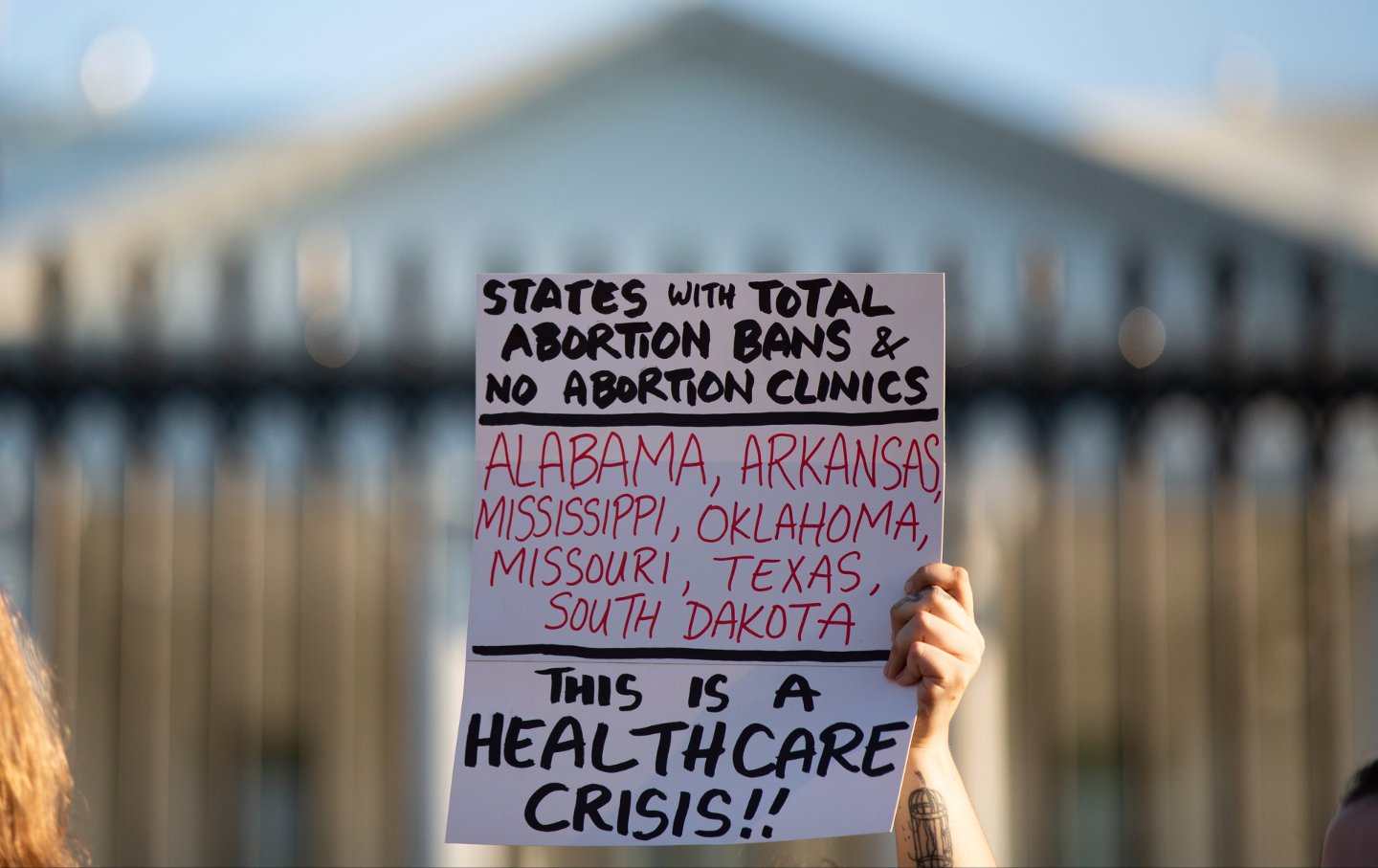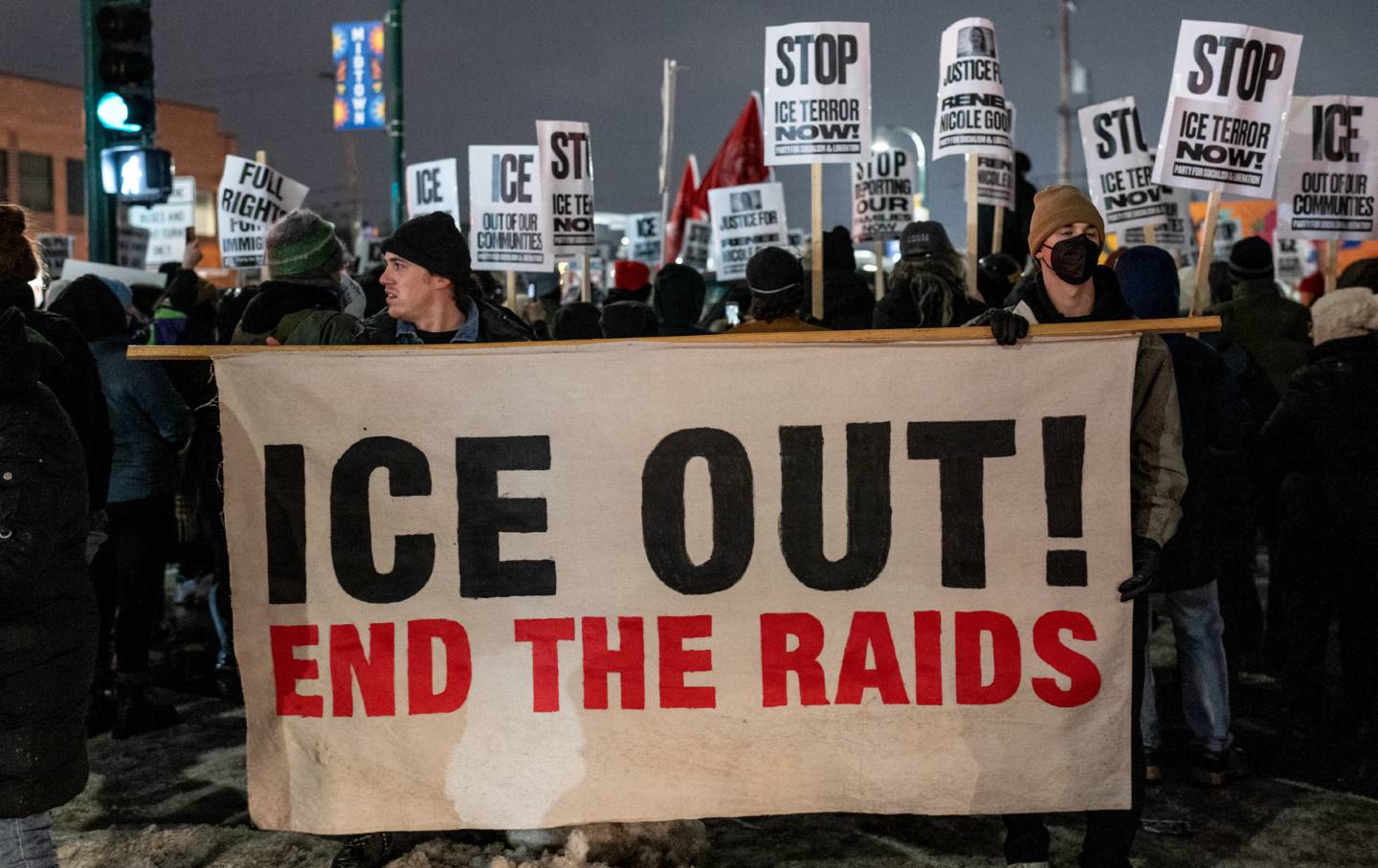The Abortion Fight That Shows Just How Broken Our Healthcare System Is
The federal government is battling states over funding for family planning services—and leaving patients caught in the middle.

A sign from a reproductive justice rally outside the White House on August 23, 2022.
(Bryan Olin Dozier / NurPhoto via AP)Since 1970, the Title X Family Planning Program has served millions of people in need of sexual and reproductive healthcare services who would not otherwise be able to access that care. But for all of those 54 years, one service has remained stubbornly outside the scope of Title X, even though it is fundamental to the concept of family planning: abortion care.
Title X isolated abortion from other reproductive healthcare services rather than seeing all of these services—contraception, sexually transmitted disease testing, and abortion—as parts of a spectrum of care that the same patient will need in their lifetime. Whether Democrats or Republicans are in the White House, the restriction has been the same: Organizations are not able to use Title X funds for programs in which abortion is deemed a legitimate form of family planning.
The current Dobbs era has proven that when abortion isn’t treated as the healthcare that it is, patients suffer. And the Biden administration has taken steps to improve Title X, particularly in light of attempts by the Trump administration to weaken it further.
But even as Biden has “modernized” the program in a number of important ways, patients remain pawns in the ongoing “debate” over their health and well-being. Now, the Supreme Court has waded into a dispute over Title X funds in Oklahoma—one that, despite seeming like a victory for abortion rights supporters, should instead force us to see how ineffective this entire system of care actually is.
The dispute concerns Title X regulations from the Department of Health and Human Services which were put in place when Biden came to office. Under the Trump administration, Title X funds could not be used by grantees for abortion referrals or counseling, and organizations were told they would need to provide family planning services in a separate building from their abortion procedures. These onerous restrictions led to a mass exodus of clinics from the program, which, combined with the Covid-19 pandemic, resulted in a significant drop in the number of Title X recipients and patients. KFF reported that the number of patients receiving care under the program went from 3.9 million people in 2018 to 1.5 million in 2020.
There is a direct overlap between the people seeking services at Title X clinics and those unable to cover the cost of abortions. Two-thirds of recipients in 2021 had an income at or below the federal poverty line, and over one-third did not have insurance. When those patients are denied family planning services and experience a pregnancy, research shows that financial reasons—like not having enough money to have another child, or to raise the child they already have—top the list for why they will seek an abortion. And when they run into barriers (logistical, financial, or otherwise) in accessing care, they have “four times greater odds of living below the Federal Poverty Level,” according to the landmark Turnaway Study, which studied the long-term effects of being denied an abortion.
The Biden administration sought to expand access to family planning services through the Title X program. Eight days after Biden’s inauguration, the White House issued a memo addressing both Title X funding and the “Mexico City Policy,” which, under Republican administrations, imposes a global gag rule on abortion by preventing nongovernmental organizations that receive federal family planning funds from providing any abortion-related services or referrals.
Biden instructed HHS to determine “whether to suspend, revise, or rescind” the Trump-Pence administration’s Title X rule. And in October of that year, HHS finalized the Biden-Harris Title X rule, which requires Title X–funded clinics to offer pregnant patients counseling about all of their options, including abortion. Importantly, the rule applies to states whether or not they have an abortion ban in place.
This is where Oklahoma comes in. It is now a crime for providers in the state “to advise or procure an abortion for any woman.” Oklahoma’s health department had accepted Title X funds with the understanding that its network of providers would need to offer pregnant people who requested it a number to a third-party hotline so that they could receive information about all of their options, including abortion. But, according to a court filing from Solicitor General Elizabeth Prelogar, the state “promptly reversed course” and said that its providers would not comply with the rule. HHS argued that the rule does not violate state abortion bans because patients are being provided a neutral resource to learn about all of their pregnancy choices, not just abortion.
Oklahoma sued the federal government over the dispute in 2023. (It is one of a dozen states challenging the government on this issue.) The case made it all the way to the Supreme Court, which, earlier this month, allowed a lower-court ruling siding with HHS to stand. This means that the agency does not have to restore Oklahoma’s funding, which has already gone to independent providers operating outside of the health department’s provider network.
But this Title X ruling is not the win it seems.
Although independent clinics received those funds, the state argued in its court documents that the decision to cut its funds affected care in 70 city and county health departments that assist residents in rural and urban communities. “In many instances, particularly in rural Oklahoma, the county health department is one of the only access points for critical preventative services for tens or even hundreds of miles.” The state continued: “Many patients whom OSDH [Oklahoma State Department of Health] employees see already have difficulty accessing the health care they need because of location, work schedules, or transportation issues. Language barriers can also create difficulties in providing services, which Oklahoma has addressed with translators.”
So under the Trump administration, clinics didn’t apply for Title X funds because they were unable to comply with its anti-abortion rules. And now under the Biden administration, some clinics in states where abortion is banned disagree with the program’s pro-choice rule and are being kicked out. At the same time, as the National Family Planning & Reproductive Health Association notes, the funds allocated to the program have been inadequate for some time—meaning that Title X clinics are receiving contradictory rules that vary from administration to administration while also being deprived of the funding they need to meet the demand for their services in their communities. All of this amounts to diminished capacity at a time when the need for contraception (and abortion, for that matter) couldn’t be greater.
Abortion stigma has created a system where even Democrats ostensibly aiming to increase abortion access wind up contributing to the problem by not addressing its root causes. When Democrats only seek to reform programs that on a basic level are not working for everyone, no matter the state or country they are in, their efforts are not enough to support women and girls and their sexual and reproductive health, as Biden vowed to do in his 2021 memo.
In a system like this, where a person’s access to care is dependent on what type of insurance or government program they qualify for, no one wins. In fact, we all lose, as more and more state dollars go toward legal fees fighting for those government programs to work as intended rather than the resources our communities need to ensure that all of its residents, including trans and nonbinary young people and adults, have what they need to thrive. Until Title X fully integrates abortion into its conception of healthcare, no administration or rule will get to the root of the issue, and in fact may cause more unnecessary delays.
It’s past time that HHS, Biden, Harris, and the party make abortion care a part of the services covered under federal healthcare programs, including Title X. That would modernize the program, and others like it, more than just allowing funded clinics to offer referrals. Abortion funds, which help people to access abortions by providing logistical and financial support, keep telling us that they are out of cash and that this moment of record-breaking need requires an even greater infusion of funds. Federal funding of abortion would go a long way toward filling that gap. And while the states that have banned abortion may not have clinics where such funding would be allowed, the money would still be available to the states that could use it.
Democrats need to be unequivocal about the fact that abortion is a legitimate form of family planning. People shouldn’t need to justify their reason for family planning services, including abortion care, but we are witnessing in real time exactly how abortion would qualify. Patients who are denied medically necessary abortions until they are near death or are forced to undergo major medical procedures that are legal in lieu of banned abortion procedures may face future fertility issues. And that’s to say nothing of the reality that pregnancy is a life-threatening condition, especially for Black women.
For many, not getting or staying pregnant is planning for the family that they already have.
Popular
“swipe left below to view more authors”Swipe →And yet, for decades now, Republican administrations have instituted extreme abortion bans through policies like the Mexico City Policy and the Title X Program, only to have Democratic administrations rescind them when they take office. This has created long-term disruptions in care for both the patients and the organizations receiving family planning funding—delays that cost lives. Outside the United States, as Time reported, “MSI Reproductive Choices, another large group that rejected U.S. funding [rather than comply with Trump’s Mexico City Policy], lost $30 million and says it could have prevented 6 million unintended pregnancies, 1.8 million unsafe abortions and 20,000 maternal deaths.”
As Renee Bracey Sherman and I argue in our forthcoming book, Liberating Abortion: Claiming Our History, Sharing Our Stories, and Building the Reproductive Future We Deserve, we need to dismantle the current healthcare system and imagine something better that actually assists all people—especially those who otherwise do not have access to care because of their financial or employment status. Our current system, by design, discriminates against people based on how much money they have. This two-tiered system puts the state’s anti-abortion interests, and insurance companies and employers’ profit motives, above the people’s actual needs. A rule change doesn’t change that fact.
No one should be turned away from needed care, and no one should lose access based on which political party has power. The only way to fix this system is to dismantle it and build an alternative with the people being denied access under our current system dictating the rules.
More from The Nation

Deportation and the Silence That Follows Deportation and the Silence That Follows
When ICE abducted my father without cause, something strange filled his vacancy.

Abolish ICE or GTFO Abolish ICE or GTFO
In this week’s Elie v. US, The Nation’s justice correspondent makes the case to get rid of ICE, explores George Conway’s congressional campaign—and shares his New Year’s resolutio...

Want to Stop ICE? Go After Its Corporate Collaborators. Want to Stop ICE? Go After Its Corporate Collaborators.
ICE can’t function without help from the private sector. So we should force the private sector to stop helping.

Pretty Please Pretty Please
Graffiti near Union Square, New York City.
OppArt / Anonymous and Peter Kuper

Europe Signs Up for More Humiliation by Trump Europe Signs Up for More Humiliation by Trump
As the post–Cold War order cracks up, the fault lines don’t just run through the Atlantic, but Europe itself.



